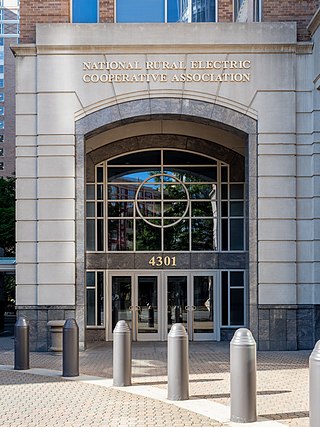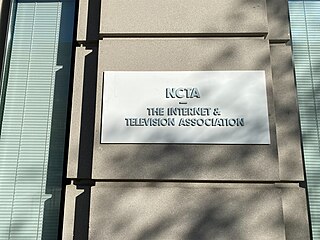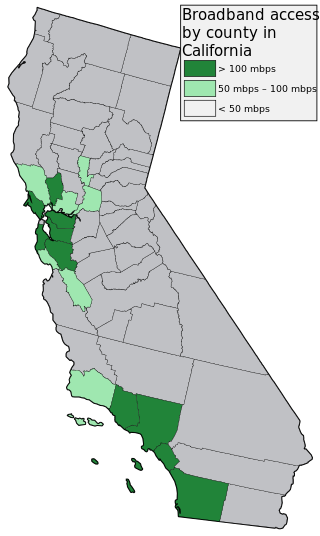
The Communications Act of 1934 is a United States federal law signed by President Franklin D. Roosevelt on June 19, 1934, and codified as Chapter 5 of Title 47 of the United States Code, 47 U.S.C. § 151 et seq. The act replaced the Federal Radio Commission with the Federal Communications Commission (FCC). It also transferred regulation of interstate telephone services from the Interstate Commerce Commission to the FCC.

An Internet service provider (ISP) is an organization that provides myriad services related to accessing, using, managing, or participating in the Internet. ISPs can be organized in various forms, such as commercial, community-owned, non-profit, or otherwise privately owned.
The United States Rural Utilities Service (RUS) administers programs that provide infrastructure or infrastructure improvements to rural communities. These include water and waste treatment, electric power, and telecommunications services. It is an operating unit of the USDA Rural Development agency of the United States Department of Agriculture (USDA). It was created in 1935 as the Rural Electrification Administration (REA), a New Deal agency promoting rural electrification.

The National Telecommunications and Information Administration (NTIA) is a bureau of the United States Department of Commerce that serves as the president's principal adviser on telecommunications policies pertaining to the United States' economic and technological advancement and to regulation of the telecommunications industry.
The Communications Assistance for Law Enforcement Act (CALEA), also known as the "Digital Telephony Act," is a United States wiretapping law passed in 1994, during the presidency of Bill Clinton.
A utility cooperative is a type of cooperative that is tasked with the delivery of a public utility such as electricity, water or telecommunications to its members. Profits are either reinvested for infrastructure or distributed to members in the form of "patronage" or "capital credits", which are dividends paid on a member's investment in the cooperative.
The United States Telecom Association (USTelecom) is an organization that represents telecommunications-related businesses based in the United States. As a trade association, it represent the converged interests of the country's telecommunications industry. Member companies represent a diverse set of communications-related businesses, including those that provide wireless, Internet, cable television, long distance, local exchange, and voice services. Members include large publicly traded communications carriers as well as small telephone cooperatives that serve only a few hundred customers in urban and rural areas. The organization was founded as the Independent Telephone Association of America in 1897, and represented the telecommunication industry of North America that was not affiliated with the Bell System led by the American Telephone and Telegraph Company (AT&T).

The National Rural Electric Cooperative Association (NRECA) represents the interests of over 900 electric cooperatives in the United States. Cooperatives are not-for-profit and are owned by their membership. Founded in 1942, NRECA unites the country's generation, transmission, and distribution cooperatives found in 47 states, serving over 40 million people. It is headquartered in Arlington, Virginia, and its CEO is Jim Matheson.

NCTA, formerly known as the National Cable & Telecommunications Association (NCTA), is a trade association representing the broadband and cable television industries in the United States. As of 2011, NCTA represented more than 90% of the U.S. cable market, over 200 cable networks, and various equipment suppliers and service providers to the cable industry.
The Universal Service Fund (USF) is a system of telecommunications subsidies and fees managed by the United States Federal Communications Commission (FCC) to promote universal access to telecommunications services in the United States. The FCC established the fund in 1997 in compliance with the Telecommunications Act of 1996. Originally designed to subsidize telephone service, since 2011 the fund has expanded its goals to supporting broadband universal service. The Universal Service Fund's budget ranges from $5–8 billion per year depending on the needs of the telecommunications providers. These needs include the cost to maintain the hardware needed for their services and the services themselves. In 2022 disbursements totaled $7.4 billion, split across the USF's four main programs: $2.1 billion for the E-rate program, $4.2 billion for the high-cost program, $0.6 billion for the Lifeline program, and $0.5 billion for the rural health care program.

The Internet in the United States grew out of the ARPANET, a network sponsored by the Advanced Research Projects Agency of the U.S. Department of Defense during the 1960s. The Internet in the United States of America in turn provided the foundation for the worldwide Internet of today.
Dakota Central Telecommunications is a utility cooperative based in Carrington, North Dakota. It provides landline telephone, dial-up, and broadband Internet services, along with IPTV service to several communities in Foster, Stutsman, and southern Wells counties, with Jamestown its largest community served.
Rural Internet describes the characteristics of Internet service in rural areas, which are settled places outside towns and cities. Inhabitants live in villages, hamlets, on farms and in other isolated houses. Mountains and other terrain can impede rural Internet access.

Merit Network, Inc., is a nonprofit member-governed organization providing high-performance computer networking and related services to educational, government, health care, and nonprofit organizations, primarily in Michigan. Created in 1966, Merit operates the longest running regional computer network in the United States.
The National Rural Utilities Cooperative Finance Corporation (CFC) is a member-owned nonprofit cooperative that provides financial products to America's rural electric cooperative network. CFC was established in 1969 to raise funds from the capital markets to supplement the loan programs for electric cooperatives offered by the U.S. Department of Agriculture’s (USDA) Rural Utilities Service (RUS), previously Rural Electrification Administration (REA).
SRT Communications is the largest telecommunications cooperative in North Dakota, serving customers with Internet, Security Alarm and Video Surveillance, Phone, and Business Phone Systems and services.
Connecting America: The National Broadband Plan is a Federal Communications Commission (FCC) plan to improve Internet access in the United States. The FCC was directed to create the plan by the American Recovery and Reinvestment Act of 2009, and unveiled its plan on March 16, 2010.

Broadband mapping in the United States are efforts to describe geographically how Internet access service from telephone and cable TV companies is available in terms of available speed and price. Mapping has been done on the national as well as the state level. The efforts are seen as preliminary steps towards broadband universal service.
Broadband universal service, also known as universal service obligation (USO) or universal broadband service, refers to government efforts to ensure all citizens have access to the internet. Universal voice service obligations have been expanded to include broadband service obligations in Switzerland, Finland, Spain and the UK.

The Protecting Cyber Networks Act is a bill introduced in the 114th Congress by Rep. Devin Nunes (R-CA), chairman of the House Permanent Select Committee on Intelligence. The legislation would allow companies and the government to share information concerning cyber threats. To overcome privacy concerns, the bill expressly forbids companies from sharing information with the National Security Agency (NSA) or Department of Defense (DOD).







